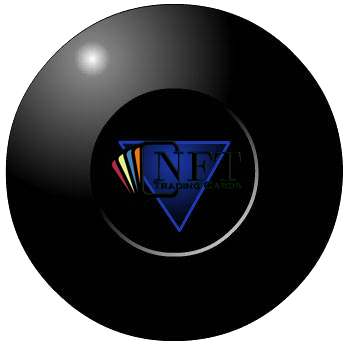Thoughts by Steve Steinberger NFT-tradingcards.biz
The NFT (Non-Fungible Token) market has seen rapid growth and evolution, and while it has faced fluctuations, it continues to be a significant player in the digital economy. Looking ahead, several predictions and trends can be identified for the future of the NFT market:

Increased Adoption Across Industries
NFTs are likely to expand beyond digital art and collectibles into various other industries. Sectors such as real estate, fashion, music, gaming, and even finance are exploring the potential of NFTs. For example:
- Real Estate: Virtual land and property NFTs are becoming more popular, and they could be used to represent real-world properties in the future, allowing for tokenized ownership and transfer of assets.
- Fashion: Luxury brands may offer limited-edition fashion items as NFTs, providing proof of authenticity and ownership.
- Music: Musicians are likely to increasingly use NFTs to sell albums, singles, and concert tickets, offering fans unique experiences and ownership rights.
Integration with the Metaverse
The development of the metaverse—virtual worlds where users can interact, socialize, and trade—will drive further demand for NFTs. NFTs will serve as the backbone for virtual assets within these environments:
- Virtual Goods: Users may buy and sell virtual goods like clothing, accessories, and property as NFTs within the metaverse.
- Identity and Avatars: NFTs could be used to represent unique avatars and digital identities, ensuring ownership and authenticity within the virtual world.
Evolution of Utility-Driven NFTs
While early NFTs were primarily valued for their rarity and artistic merit, there is a growing trend toward utility-driven NFTs that offer practical benefits or services:
- Memberships and Access: NFTs could serve as digital memberships, granting holders access to exclusive clubs, events, or content.
- Gaming: In-game items as NFTs will become more common, allowing players to truly own, trade, or sell their virtual assets across different games and platforms.
- Dynamic NFTs: These NFTs can change or evolve based on specific conditions or interactions, creating more engaging and interactive experiences.
Environmental and Ethical Concerns
The environmental impact of blockchain technology, particularly Proof of Work (PoW) systems, has been a concern in the NFT space. As a result:
- Transition to Eco-Friendly Blockchains: There will be a shift toward more eco-friendly blockchains and Layer 2 solutions, such as Ethereum’s transition to Proof of Stake (PoS) and the use of sidechains like Polygon.
- Sustainable Practices: Artists and platforms are likely to adopt sustainable practices, including carbon offsets and using energy-efficient blockchain technologies.
Regulatory Developments
As the NFT market grows, it will attract increased regulatory scrutiny. Governments and regulatory bodies are expected to introduce new guidelines and laws to address concerns such as money laundering, intellectual property rights, and consumer protection:
- Clearer Legal Frameworks: There will be a push for clearer definitions of ownership, rights, and liabilities associated with NFTs.
- Tax Implications: Governments may develop more defined tax policies around the sale and transfer of NFTs, particularly as they become more integrated into financial markets.
Enhanced Interoperability
Currently, many NFTs are tied to specific blockchains or platforms, which limits their usability across different ecosystems. The future will likely see:
- Cross-Chain Solutions: Development of protocols that enable NFTs to be transferred and used across different blockchains without losing functionality or value.
- Standardization: Efforts to create standardized formats for NFTs, allowing greater compatibility between platforms and applications.
Market Maturation and Stabilization
As the market matures, we can expect a few key developments:
- Sophistication of Buyers: Buyers will become more discerning, valuing NFTs not just for hype but for their intrinsic and long-term value.
- Price Stability: The market may see less volatility as it matures, with prices stabilizing and speculation decreasing. This could lead to more sustainable growth.
- Institutional Investment: Larger financial institutions and funds may start to invest in NFTs, seeing them as a legitimate asset class.
Expansion of Community-Driven Projects
The concept of decentralized autonomous organizations (DAOs) is gaining traction, and NFTs will likely play a key role in these community-driven projects:
- DAO Governance: NFTs could represent voting power or membership in DAOs, allowing holders to participate in decision-making processes.
- Collaborative Ownership: Groups of individuals could collectively own and manage NFTs, sharing both the benefits and responsibilities.
Enhanced Security and Fraud Prevention
As the market grows, so will the importance of security and fraud prevention:
- Advanced Authentication: NFTs may incorporate advanced verification methods, such as biometrics or multi-signature wallets, to ensure secure transactions.
- Anti-Fraud Measures: Platforms and marketplaces will likely introduce more robust anti-fraud measures, including AI-driven systems to detect and prevent counterfeit NFTs.
Social and Cultural Integration
NFTs are expected to continue influencing culture and society, becoming more integrated into our daily lives:
- Social Media Integration: Social media platforms may further integrate NFTs, allowing users to showcase their collections and digital assets directly on their profiles.
- Cultural Significance: NFTs will likely become a significant part of cultural heritage, with museums and galleries creating digital archives of important works and moments.
Conclusion
The NFT market is poised for continued growth and innovation, with new use cases, technologies, and regulations shaping its evolution. While there will be challenges, such as environmental concerns and market volatility, the potential for NFTs to revolutionize industries and redefine ownership in the digital age is immense. As the market matures, we can expect more stability, broader adoption, and a deeper integration of NFTs into various aspects of life, from finance to entertainment to personal identity.

Leave a Reply